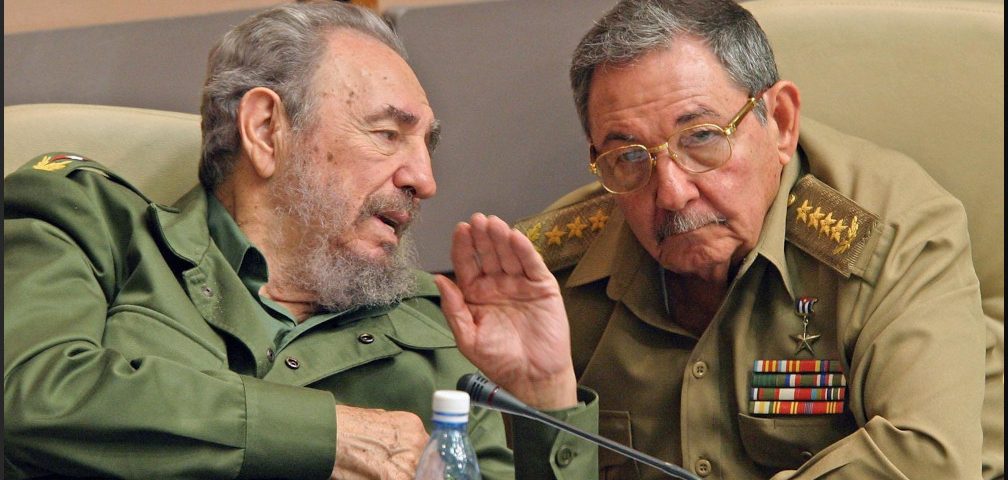By Alejandra Garcia, published on Resumen English, April 20, 2021
This Monday, Cuba closed the doors of its most important political event of 2021: the eighth Congress of the Communist Party (PCC). Following four days of sessions, 60 years after the failure of the US invasion of the island, the historic generation of the Revolution took the podium to announce its farewell to the people.
Raul Castro fulfilled what he promised at the 7th Cuban Party Congress held in 2016. This Monday, he stepped down as First Secretary of the PCC Central Committee. He was replaced as First Secretary by President Miguel Díaz-Canel.
“Today my militancy concludes with the satisfaction of having fulfilled my duty to Cuba. I have confidence in its future, and I will be ready to offer my modest knowledge for the benefit of the people until the end of my days,” Castro said.
The man of “proverbial modesty,” as Díaz-Canel described him, said goodbye before the eyes of the world, undefeated and unbowed. Several times, he was in the crosshairs of Washington-paid assassins who sought to assassinate the Revolution´s main leaders in an effort to destroy the revolutionary changes that Cuba generated after its triumph in 1959.
“They could not kill them,” the Cuban president stressed, alluding to the leaders of the historic generation of the Revolution, led by Fidel Castro and Raul. Other political leaders, the last exponents of the clandestine struggle in the mountains, such as José Ramón Machado Ventura and Commander Ramiro Valdés, also said their farewells on Monday.
The transfer of leadership and responsibilities to the new generations of communists will not be abrupt, nor will it imply that the new political leadership will be alone from now on. “Raul will always be on top of everything, contributing ideas and purposes to the revolutionary cause, through his advice and alert to any mistakes and shortcomings,” Diaz-Canel stressed.
The colossal work undertaken by Raul, his resistance in the face of threats and aggressions, and his search for the improvement of the Cuban society will serve as a road map for years to come.
La Jornada described this moment:
“The apocalyptic prophecies of a collapse of the Cuban government after the physical or political disappearance of Fidel and Raul are no longer valid. So far, the island’s government has proven to be capable of continuing to exercise power in the face of every change of era, with no instability or anxiety.”
Raul, who assumed the Cuban presidency in 2008 amid a difficult economic and social situation, promoted improving and updating the Cuban economy. During his years as president, Cuba was also key to the consolidation of the Colombian peace process and the strengthening of Latin American integration.
“He always knew for what and for whom the Revolution was going to be made. He was always clear that this struggle was not only for Cuba but for Latin America and against imperialism. Talking with him was stimulating for the spirit: cheerful, communicative, self-confident, very clear in the exposition of his ideas, with an incredible capacity for analysis and synthesis,”
recalled Hilda Gadea, Ernesto Che Guevara’s then wife, after meeting Raul a few months before the expedition of the ‘Granma’ yacht, in 1956.
Since 2008, when Raul succeeded the historic leader of the Revolution, Fidel Castro, as the country´s leader, he led a groundbreaking update to the Migratory Law, promoted transformations in the agricultural sector, expanded the forms of management of the economy’s non-governmental sector, and motivated the creation of a new Foreign Investment Law.
Under his mandate, the country created the Mariel Special Development Zone, eliminated obstacles for the improvement of the socialist state enterprise, and promoted investments in the tourism sector.
With patience and intelligence, as Diaz-Canel noted, Raul achieved the negotiated release of the Cuban Five, fulfilling Fidel’s promise that they would return to their homeland. With mettle, he led the talks and negotiations to re-establish diplomatic relations between Cuba and the U.S. in 2015, under then-President Barack Obama’s administration.
“I can say much more Of Raul and the historic generation. I can affirm that the Revolution does not end with their farewell, because the historic leaders formed new generations equally committed to the ideals of social justice. What we receive today are not positions and tasks, it is not only the leadership of a country. What we have before us, continuously challenging us, is their huge heroic work,”
Diaz-Canel said minutes before the 8th Congress of the PCC concluded.
*Featured Image: FIDEL CASTRO, left, and his brother Raul in Havana in 2003. Fidel, who took control of Cuba in 1959 after his revolutionary forces ousted Fulgencio Batista, handed over power to his brother in 2006. (Adalberto Roque AFP/Getty Images)
